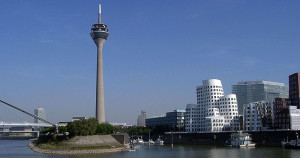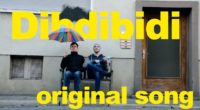
With the 2011 Eurovision Song Contest starting in just a few days it’s time to take a closer look at this year’s host city; Düsseldorf. What’s the history behind the city and where are they today? EuroVisionary has delved into the history books.
Close to where the river Düssel sheres it’s waters with the mighty river Rhine, there once stood a Roman watchtower. The watchtower is long gone and so are the Romans, but a city blossomed, when settlers in the 7th century founded what was to become the city of Düsseldorf.
The first time the name Düsseldorf is written on paper was when Count Adolf the 5th of Berg in the year 1135, after the battle at Worringen, granted the settlement city rights between him and the archbishop of Cologne. A monument celebrating the victory can be seen on the Burgplatz.
In 1380 Düsseldorf was promoted to regional capital by Duke Wilhelm, who allso decided to build his castle there. Under the rule of duke Johann Wilhelm the 2nd , Düsseldorf was flourishing, but when he died in 1716 his succesor, Karl Thedore, transferred the power structure to Munich where he also had some property, finding Bavaria more to his taste.
During the Napoleonic wars, Düsseldorf was devastated, and the once so prosperous city was plagued by poverty. After the peace conference in Vienna in 1815, Düsseldorf was handed over the the king of Prussia.
In the mid 19th century, the industrial revolution provided Düsseldorf with something of a renaissance; the city became center for the ever growing industry of train building. The city, now thriving and with a bright future, attracted more and more people, and at the turn of the century had more than 200.000 inhabitants.
Following the German defeat in the Great War (1st World War) in 1918, Düsseldorf, along with other German cities fell back into deep despair. This was primarily due to the burden of paying for war damage, especially to France, which took the wind out of the economy, and many a young man needed in the industry went to an early grave.
A general strike arose in 1920, with Düsseldorf as its center. The 15 of April, 1920 is one of the darkest days in the history of Düsseldorf, because on that day 45 delegates from the German miners union was murderd by members of one of the many rightwing German Freikorps. These freecorps, were the first of many nightmares that would lead to Adolf Hitler coming to power and creation of his 3rd Reich in 1933.
During the Second World War Düsseldorf was the target for several strategic bombings that halted the production of weapons and trains from companies such as Rheinmetal-Borsig. In many of these raids more then 700 planes took part, and when the war ended in may 1945, Düsseldorf was back where it started. The city and its industry was in ruins, and the nazi legacy hung as a dark shadow over the survivors. The future of Düsseldorf looked decidedly bleak.
In 1946, the allied high command made Düsseldorf the capital of the new federal state of North Rhine-Westphalia, and the inhabitants started to rebuild there home town.
Today Düsseldorf is a modern city, with a population of 750.000. It’s known as one of the centers for Germany’s telecommunication and internet industries. The airport is the third largest in Germany, and the rail infrastructure is second to none.
When it comes to rest and recreation Düsseldorf has a lot to offer; take a walk in the old city center or enjoy the Köningsallee and the historic town hall. Try the traditional cuisine and dont miss out on Düsseldorf Altbier (oldbeer), or you could simply take a trip to the Rhein tower. Its 240 meters high and open between 10.00 and 23.30.
Whatever you decide to do, be careful if you are a man and plan on taking a boattrip on the river Rhine.
If you here a beautiful femal voice, it’s not one of the participants of this year’s Eurovision final, but Lorelei who tries to lure you to jump into the river, so she can catch your soul.
This was what I found out about Düsseldorf, some might say “not a dramatic story”. Well, I think Düsseldorf has enough to show you if you decide to go to the Eurovision Song Contest, or later for that matter, and its always good to learn something new, don’t you think?



















